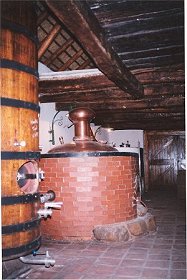History: Oude Wellington was originally known as Onverwacht, meaning "un-expected" in Dutch. This rings true, because unexpectedly a green valley opens before you when entering the Wamakersvallei (valley of the wagon builders) at the foot of the Hawaque Mountains. Its slopes extend to the farm. First buildings date back to 1790 and was allocated to Johannes Jacobus van der Merwe on 12th February 1782 an immigrant from Holland. Other owners include Johannes Petrus Louw, Mabel Jane Malcolm, G.W.D. Walters, Nicolaus Gabriel Vos and Mr. Benni Kok. The town of Wellington (named after the Duke of Wellington) developed only later with the steady growth of new immigrants that were heading towards the Karoo with their ox-wagons and all their possessions. The mountains stopped the trek until the wagons were taken apart for the difficult passage across the passes. A small industry of wagon builders settled at the foot of the mountains. Hence, the valley was dubbed Wamakersvallei until Mr. Bains, a British engineer, built the Bainskloof road across the pass. In the following decades the renamed Wellington received city-rights and grew fast to almosy reach today's size (valley of the wagon builders) at the foot of the Hawaque Mountains. Its slopes extend to the farm. First buildings date back to 1790 and was allocated to Johannes Jacobus van der Merwe on 12th February 1782 an immigrant from Holland. Other owners include Johannes Petrus Louw, Mabel Jane Malcolm, G.W.D. Walters, Nicolaus Gabriel Vos and Mr. Benni Kok. The town of Wellington (named after the Duke of Wellington) developed only later with the steady growth of new immigrants that were heading towards the Karoo with their ox-wagons and all their possessions. The mountains stopped the trek until the wagons were taken apart for the difficult passage across the passes. A small industry of wagon builders settled at the foot of the mountains. Hence, the valley was dubbed Wamakersvallei until Mr. Bains, a British engineer, built the Bainskloof road across the pass. In the following decades the renamed Wellington received city-rights and grew fast to almosy reach today's size
In 1995 the present owner bought the farm, which was in a pitiful state and restored it to its former beauty. In the same year a small wine cellar was established that produced a fine red wine. Not much later, the brandy cellar was added. Piece by piece the derelict buildings came into use again. Restored and improved, re-thatched and rebuilt. Original gables were restored to their former historic character as part of Cape Dutch architecture.
Today the farm has guest accommodation in the original farmhouse and slave quarters. Air-conditioned and restored, with separate entrances and en-suite bathrooms, there is little left of the hardship the first settlers had to endure to make a living on this land. The area of Wellington is the main producer of stockies (young wine nursing) for the entire wine industry. Dried fruit, leather products and spectacular landscape invite the visitor to stay and experience hospitality and nature. Several private cellars are proud to present their award-winning wines, which are among the best the Cape has to offer.
|

